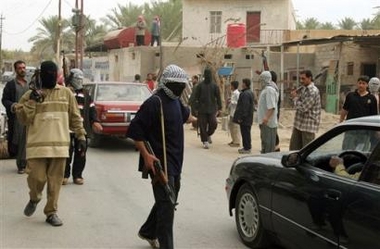|
Islamic extremists: Iraqi vote 'satanic'
(AP)
Updated: 2005-12-13 08:46
Soldiers, patients and prisoners began voting Monday in national elections,
three days ahead of the general population, while insurgents denounced the
balloting as a "satanic project" but did not threaten to attack polling
stations.
The early voting went ahead despite the sound of detonations rumbling across
the capital and at least 15 deaths in ongoing violence.
US President Bush offered encouraging words from Washington to Iraqi voters
but cautioned that the parliamentary elections "won't be perfect."
"Iraqis still have more difficult work ahead, and our coalition and a new
Iraqi government will face many challenges," the president said in a speech in
Philadelphia.
Asked about the number of Iraqi casualties from the war and the insurgency,
Bush said: "I would say 30,000, more or less, have died as a result of the
initial incursion and the ongoing violence against Iraqis." White House
counselor Dan Bartlett later said the number was not an official figure but that
Bush was simply repeating public estimates reported in the media.

Hooded men carrying assault rifles check
passing cars in Ramadi, Iraq Monday, Dec. 12, 2005, ahead of the Dec. 15
parliamentary elections, which will select a National Assembly that will
serve for four years. [AP] | In a rare joint statement, Al-Qaida in Iraq and four other Islamic extremist
groups denounced the election as a "satanic project" and said that "to engage in
the so-called political process" violates "the legitimate policy approved by
God."
The groups vowed to "continue our jihad (holy war) ... to establish an
Islamic state ruled by the book (the Quran) and the traditions of the Prophet
Muhammad."
However, the statement contained no clear threat to disrupt voting as in the
run-up to the Jan. 30 election and the Oct. 15 referendum on the constitution.
The authenticity of the statement could not be verified, but it appeared on a
Web site that often publishes extremist material.
The absence of a clear-cut threat could reflect the growing interest among
Sunni Arabs, the foundation of the insurgency, to take part in the election. The
Sunni decision to boycott the January ballot left parliament in the hands of
Shiites and Kurds 錕斤拷 a move which increased communal friction and cost the Sunnis
considerable influence in drafting the constitution.
|